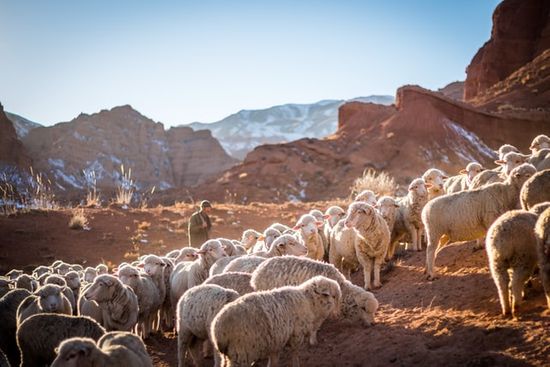The Legacy of Moses: What His Life Teaches Us
A baby on death row, an outcast prince, a humble shepherd, and an unlikely deliverer. All these titles describe the individual that led Israel out of slavery in Egypt to the borders of the Promised Land.
This was Moses—a man who wasn’t even supposed to be alive, who allowed God to use him in mighty ways.
To understand him better and know why God fought so hard for him, we’re going to discuss:
You’ll learn about an incredible man—who may not be as different from you as you’d think!
Let’s dive in.
Who was Moses?
Moses is one of the most prominent figures in the Old Testament of the Bible. Scholars believe he lived during the 15th century BC.1 Though best known for leading the Hebrew nation, or the Israelites, from Egypt to Canaan, he is also credited as the primary author of the first five books of the Bible. His story is one of God fighting for him and his people, and molding him into a patient, self-sacrificing, faithful leader.
Here are some of the important highlights from his unique life.
Escaping death as an infant
 Moses’ life started in hiding from the ruler of Egypt, who declared that all Hebrew baby boys be killed. But through the ingenuity of his mother, Moses survived and became part of the royal family.
Moses’ life started in hiding from the ruler of Egypt, who declared that all Hebrew baby boys be killed. But through the ingenuity of his mother, Moses survived and became part of the royal family.
Here’s how it happened.
A few hundred years before, the Pharaoh at the time allowed the Israelites to settle in Egypt during a famine (Exodus 12:40). As time passed, they remained there as sheepherders and grew into a nation.
The next Pharaoh, however, felt threatened by this growth. So he found a way to enslave the people (Exodus 1:7–11).
But they continued to increase (verse 12).
Fearful of a revolt, Pharaoh turned to drastic measures. That’s when he commanded the murder of all male Israelite babies.
It was under this death threat that a Levite woman—named Jochebed—gave birth to a son and was determined to hide him (Exodus 2:1–2; 6:20).
She was successful for three months. But as her baby grew, she knew she’d have to do something else. So she weaved a little basket, placed her son in it, and hid the basket in the reeds by the river bank (Exodus 2:3).
Who would discover the baby?
None other than the Egyptian princess (verse 4)! She recognized that the baby was “one of the Hebrews’ children” (verse 6, NKJV) and decided to adopt him, paying his mother to nurse him until he was older (verses 7–9).
The Egyptian princess “named him Moses, ‘because,’ she said, ‘I drew him out of the water’” (verse 10, ESV).
An outcast prince
Moses grew up in the Egyptian royal family with access to life’s best—a university education, the finest cuisine, and all the honor attributed to royalty (Acts 7:22). Above all, he was in line to the throne of Egypt.2
But this was not to be.
Hebrews 11:24–25 recounts:
“By faith Moses, when he was grown up, refused to be called the son of Pharaoh’s daughter, choosing rather to be mistreated with the people of God than to enjoy the fleeting pleasures of sin” (ESV).
He wanted to share the sufferings of his people and free them from slavery. Perhaps he could use his position to do so.
One day, enraged over the poor treatment of a Hebrew slave, he murdered an Egyptian taskmaster and buried him in the sand.3
Since Moses had taken matters into his own hands, he soon had to hide from Pharaoh again (Exodus 2:15).
A humble shepherd
 At this point, Moses’ life had taken a different turn than he intended. A fugitive in the wilderness of Midian, he married and spent 40 long years tending sheep (Exodus 2:15–21; 3:1). God knew that he needed those quiet years to prepare him to be an effective leader.
At this point, Moses’ life had taken a different turn than he intended. A fugitive in the wilderness of Midian, he married and spent 40 long years tending sheep (Exodus 2:15–21; 3:1). God knew that he needed those quiet years to prepare him to be an effective leader.
And it was as a shepherd that he would receive His special calling and mission.
An unlikely deliverer
God had big plans to redeem the Israelites from their wrongful enslavement. When the next Pharaoh was instated, God called Moses as the deliverer of His people (Exodus 2:23–25).
While tending sheep near a mountain called Horeb, Moses noticed something strange: a bush that was on fire but wasn’t burning up.
God spoke to him out of this burning bush, instructing him to lead the Israelites out of Egypt and promising to be with him and guide him (Exodus 3:4–12).
Little did he know what that would entail. He accepted the position with great humility and even self-distrust.
A leader of Israel
At 80 years of age, Moses accepted God’s call to lead the Israelites out of Egyptian bondage. It would be no small feat, considering that Pharaoh was not going to easily give up his nation’s workforce. But God promised to use Moses and work miracles on behalf of the Hebrew people.
He worked through Moses in many ways, including:
- To confront Pharaoh and perform miracles through God’s power (Exodus 5:1–3; 7:10–13)
- To declare ten different plagues that God would bring on the Egyptians (Exodus 7–11)
- To part the Red Sea and lead the Israelites across (Exodus 14:13–22)
- To guide the Israelites in their wilderness wanderings and mediate between them and God (Exodus 16–17; 19:9; 20:19; 32:30–35)
- To act as a judge when disputes came up among the people (Exodus 18:13–16)
- To relay the Ten Commandments and God’s other instructions (Exodus 20–31)
- To direct the building and set-up of the sanctuary/tabernacle (Exodus 40; Leviticus 9)
They were tasks that required Moses to be intimately connected with God.
What kind of relationship did Moses have with God?
Moses had a very close relationship with God—one that he developed over his lifetime as he learned to trust God more and to trust himself less. He had to let go of pride in his own ideas so that he could depend completely on God’s plan.
The following are three facets of his relationship with God:
Communication with God
 As Moses came to know God better, he approached God in a way that showed he was in harmony with Him. He longed to know God and was willing to put himself on the line for the people of Israel. His communication with God reflected this attitude.
As Moses came to know God better, he approached God in a way that showed he was in harmony with Him. He longed to know God and was willing to put himself on the line for the people of Israel. His communication with God reflected this attitude.
The first communication between him and God that is mentioned in the Bible takes place at the burning bush. Moses was caring for a flock of sheep when he encountered a bush on fire that wasn’t burning up. As he pondered the strange phenomena, God spoke to him from the burning bush, calling him to lead the people of Israel out of Egypt (Exodus 3:1–7).
But there’s more.
Exodus 33:11 tells us that “the LORD would speak to Moses face to face, as a man speaks to his friend” (ESV).
Moses had the opportunity to approach God on Mount Sinai—the “mountain of God”—and spend 40 days there communing with Him (Exodus 20:21; 24:1–2, 18). He even made a bold request to be able to see God’s glory (33:15–23).
Speaking of boldness, we can’t forget how Moses interceded on behalf of the Israelites when they rebelled against God (Exodus 32:30–34; Numbers 7:89):
He even went so far as to beg God to let him take on the consequences Israel deserved. And God preserved both Moses and the Israelites (Psalm 106:23).
Trust in God
 Trusting God wasn’t easy for Moses, especially in the beginning. But his faith grew over time, and through many challenging circumstances.
Trusting God wasn’t easy for Moses, especially in the beginning. But his faith grew over time, and through many challenging circumstances.
At the burning bush, Moses questioned his own ability to speak and lead, even though God had promised to go with him and had given him miraculous signs to prove it (Exodus 4:1–9). Moses went so far as to say:
“Please send someone else” (verse 13, ESV).
But God was patient with his lack of faith and gave him his brother Aaron as a spokesperson (verses 10–17).
And his faith grew as he:
- Went before Pharaoh, demanding the release of the Israelites and declaring the plagues that would come (Exodus 7:19–20; 8:1)
- Parted the Red Sea with his rod when it seemed like the Egyptians would capture the Israelites (Exodus 14:13, 21)
- Cried out to Him in moments of distress (Exodus 15:25)
- Dealt with the people’s complaints and struggles (Exodus 15:22–26; 16–17)
- Lifted his rod in faith to God so that the Israelites would be victorious over the Amalekites (Exodus 17:11–12)
Even so, Moses was human. He struggled too. One of the biggest examples of this is the way he distrusted and disobeyed God in a moment of anger (Numbers 20:2–13).
The Israelites had been complaining about not having water, so God told Moses to speak to a rock and water would come out. Instead, he angrily struck the rock and “spoke rashly with his lips” (Psalm 106:33, ESV).
Because of his lack of faith, God didn’t allow Moses to enter the Promised Land (Numbers 20:12). But He had something greater in store for Moses: After his death, He resurrected him and took him to heaven—to the ultimate Promised Land (Matthew 17:1–3).
Despite Moses’ shortcomings, God helped him overcome many obstacles to become the man of faith that he was. We’ll look at those next.
Obstacles Moses overcame
Pride, impatience, and self-reliance were persistent obstacles Moses had to face during his lifetime.
When he was 40 years old, he thought God was going to use his military might and royal position to deliver the people of Israel (Acts 7:23–25).
Little did he realize how much he had to learn! He would have to wait 40 years in the wilderness as a shepherd, learning to trust God’s plans more than his own.
Those 40 years did their work. When God appeared to him at the burning bush (Acts 7:30), he recognized his smallness and incapability without God (Exodus 4:10).
He also became a servant leader—one who was willing to give his very life for those he was leading (Numbers 14:13; Exodus 32:30–34). He came to care about the people and God’s honor more than about himself.
This change in his attitude may be the very reason that the Bible says he “was a very humble man, more so than anyone on the face of the earth” (Numbers 12:3, CSB).
The legacy of Moses
Moses left behind a great legacy for the nation of Israel by leading them to the Promised Land. But he also left us a legacy in the many lessons we can learn from his experiences and relationship with God.
These lessons include:
- God has a plan for our lives from the very start.
- Delay and apparent failure aren’t necessarily the end of the story. They can be God’s ways of preparing us for greater things.
- God needs humble people.
- A true leader is a servant.
- Leaders need support.
And above all, his life pointed forward to the greatest servant-leader—Jesus Christ—who would come and sacrifice Himself for His people.
God has a plan for our lives from the very start
God was watching over Moses from babyhood, giving his mother wisdom to hide her son so that he could be preserved for God’s purpose.
Similarly, God has a purpose and calling for each one of our lives (Isaiah 43:1). And as we trust Him, He will guide us into that purpose.
Delay and failure aren’t obstacles for God. He can use every situation to strengthen us
 Moses may have thought he was a failure when it came to delivering Israel. Even his own people didn’t support his attempts at first (Exodus 2:11–14). It wouldn’t be until after 40 years of herding sheep in the wilderness that God would call him to be Israel’s leader (Acts 7:30).
Moses may have thought he was a failure when it came to delivering Israel. Even his own people didn’t support his attempts at first (Exodus 2:11–14). It wouldn’t be until after 40 years of herding sheep in the wilderness that God would call him to be Israel’s leader (Acts 7:30).
But in God’s eyes, that failure was not a dead end. And those 40 years were certainly not wasted.
If you find yourself at a point of failure, wondering why it’s taking so long to reach success, be encouraged by Moses’ experience. God hasn’t given up on you. In fact, He may be using the current circumstances to make you into the person the situation calls for.
God needs humble people
God used Moses’ 40 years in the wilderness to teach him the important lesson of humility. As he cared for sheep, he learned to trust in God’s plans instead of trusting his way of doing things. He also learned the importance of being teachable and taking advice from others (Exodus 18:14, 17).
God is likewise looking for us to be humble and teachable. James 4:10 promises:
“Humble yourselves before the Lord, and He will exalt you” (CSB).
When we’re humble, then God can help and empower us.
A true leader is a servant
Moses learned that true leadership is not about force and power; it’s about service and sacrifice. This lesson became so real in his life that he was willing to sacrifice himself when God had to confront the Israelites’ rebellion and disobedience.
When we seek leadership positions, do we have the same attitude of self-sacrifice?
Leaders need support
Leading a nation of people through the wilderness was a heavy burden for Moses to carry. But he didn’t do it alone. God provided him with people to support and counsel him in his work.
His brother Aaron was one of those individuals.
For example, when the Israelites fought against the Amalekites, Moses stood on a hill above the battle and held up his rod. As he kept his rod up, the Israelites were victorious. But as he would begin to grow tired, Aaron and another man named Hur “supported his hands, one on one side and one on the other so that his hands remained steady until the sun went down” (Exodus 17:12, CSB). Together, they were victorious.
Another support to Moses was his father-in-law, Jethro. When Jethro saw the burdens Moses had taken upon himself, he encouraged Moses to delegate his work to save his strength (Exodus 18:14–23).
The moral of these stories?
We were not meant to face life’s challenges alone. And so, God places us in communities where we can support one another—and be even more effective than if we tried to handle everything solo.
Moses’ life pointed to Jesus Christ
 The greatest legacy Moses left behind was the way his life and character pointed to Christ. Notice what he said about the coming Messiah:
The greatest legacy Moses left behind was the way his life and character pointed to Christ. Notice what he said about the coming Messiah:
“The LORD your God will raise up for you a Prophet like me from your brethren. Him you shall hear in all things, whatever He says to you” (Acts 3:22, NKJV, see also Deuteronomy 18:15).
As a faithful servant of God in caring for the Israelites, he exemplified how Christ would be a faithful servant over all God’s people. An author of the New Testament reflects on this symbolism:
“Moses was faithful as a servant in all God’s household, as a testimony to what would be said in the future. But Christ was faithful as a Son over His household” (Hebrews 3:5–6, CSB).
Continuing the legacy of Moses
After hearing of near-death scenarios, the parting of the Red Sea, and encounters with God, you may think that Moses’ experience is far from your day-to-day.
Yet it’s not.
He was a human being—just like any of us—who struggled with doubts, fears, and failure. If God could use him, then God can use us!
The key is complete humility and trust in God. When we choose to depend completely on Him, He will:
- Bring us into that ever-deepening connection with Him
- Part the seas of impossibility in our lives
- Gain victories over the sins that attack us
- Use us to lead others out of the bondage in their lives
So take some time to get to know Moses in the Bible.
Immerse yourself in the lessons he learned.
Because you can continue the legacy he started.
1. DeCanio, Frank, “2. Analysis and Synthesis of Exodus,” Bible.org, March 27, 2012. [↵]
2. Ritenbaugh, Richard T., “What the Bible says about Moses as Part of Royal Family,” Forerunner Commentary, BibleTools.org. [↵]
3. Magonet, Jonathan, “Raised as an Egyptian, How Does Moses Come to Identify as a Hebrew?” TheTorah.com, 2021; Nelson, Ryan, “Moses: The Old Testament’s Greatest Prophet,” OverviewBible, July 27, 2020. [↵]
Questions about Adventists? Ask here!
Find answers to your questions about Seventh-day Adventists
More Answers
The Health Benefits of Fresh Air You Should Know About
The Health Benefits of Fresh Air You Should Know About“When you can’t breathe, nothing else matters,” the American Lung Association tells us. And while that’s true, the kind of air you’re breathing will determine the health benefits you experience. Breathing fresh...
What Do Seventh-day Adventists Choose to Eat?
What Do Seventh-day Adventists Choose to Eat?Food blogs overwhelm the internet; food fads are all the rage; and copycat and healthy versions of food are the subject of many a get-together. Eating—and eating the best way—is a big deal. And everybody has a different...
10 Incredible Ways Sunlight Can Improve Your Health
10 Incredible Ways Sunlight Can Improve Your HealthAre you concerned about sunlight’s negative effects? You might be the one who lathers on the sunscreen and covers up when you go outside. Or maybe you avoid being outside as much as possible. You might be surprised,...
Why Is Water So Important?
Why Is Water So Important?We all know that water is a substance we can’t live without. It quenches our thirst and keeps us hydrated on the inside. And it’s necessary for hygiene and cleansing on the outside too. But did you know that the cleansing properties of water...
Ellen White’s Writings and the Adventist Health Message
Seventh-day Adventists are known for their emphasis on healthy living. And Ellen G. White was a significant influence in the development of this priority and practice among Adventists.
Health Clinics
Ellen White and Adventist Healthcare—Ahead of Their Time Medical care in the mid-1800s was primitive, to say the least. Basic concepts we take for granted—such as proper handwashing or recognizing the dangers of bloodletting—were nonexistent. And doctors often had...
What Did Ellen White Teach about Vegetarianism?
What Did Ellen White Teach about Vegetarianism?One thing you might have heard about Seventh-day Adventists is their emphasis on a vegetarian lifestyle. If you’re wondering why that is, it goes back to our church’s humble beginnings: As Adventists studied the Bible,...
How Ellen White’s Teachings Can Improve Your Health
How Ellen White’s Teachings Can Improve Your Health Healthcare in the nineteenth century was said to leave “more disease than it took away” with its use of bloodletting and “medicines” like mercury and arsenic.1 As people questioned these methods, new approaches...
Change Your Perspective on Life with These 5 Mindsets
5 Biblical Mindsets to Change Your Life for the Better Sometimes, life is just plain hard. There’s no way around it. So would thinking about things differently really change anything? Our perspective on life, and everything it throws at us, affects more than we’re...
Bible Promises for When You’re Worried or Fearful
Bible Promises for When You’re Worried or Fearful The Bible is full of beautiful promises that can comfort us in a variety of situations. They can give us hope when we are hopeless, make us feel grateful for God’s love, and comfort us when we’re grieving or suffering....
12 Practical Ways to Overcome Worry
12 Practical Ways to Overcome Worry DISCLAIMER: This content is for informational purposes only. It does not constitute any professional medical advice and is not intended as a substitute for professional mental health therapy. It’s easy to get stuck in a cycle of...
How the Bible Talks About Worry, Fear, and Anxiety
How the Bible Talks About Worry, Fear, and Anxiety Worry and fear are the ingredients of anxiety. It’s easy to see how the world isn’t perfect—and the anticipation of a bad event or experience (that may or may not even happen) can end up draining the peace and...
How to Calm Anxious Thoughts, Using the Bible
How to Calm Anxious Thoughts, Using the Bible You were expecting a phone call from your daughter half an hour ago, and she still hasn’t called. She’s also not answering your calls. You feel your heart thumping as your thoughts race: What if she’s been in a car...
What You Should Know About the Adventist Health Studies
What You Should Know About the Adventist Health StudiesYou may have heard that Seventh-day Adventists care about health. But what you may not know is that Adventists have been the subjects of long-term research into lifestyle and health. Since 1958, researchers from...
Benefits of Sunlight
Yes, There Are Health Benefits of SunlightDespite the bad reputation it’s gotten, sunlight is generally associated with positivity, as shown by songs like “You Are My Sunshine,” or phrases that refer to delightful people as having a “sunny disposition.” There’s a...
Why Your Body Needs Rest for Optimal Health
Why Your Body Needs Rest for Optimal HealthStruggling to think straight? Wondering why you can’t remember that important tidbit you heard earlier today? Feeling like your emotions are about to explode? These are just some of the symptoms that can reveal your need for...
The Seventh-day Adventist Diet: One of Our Key Longevity Secrets
The Seventh-day Adventist Diet: One of Our Key Longevity SecretsOats, avocados, lentils, tofu—probably not what you first think of in a standard American diet. But if you show up at the home of an Adventist, chances are you may be served one of these staples. Out of a...
Why You Need Fresh Air
Why You Need Fresh Air“When you can’t breathe, nothing else matters,” the American Lung Association tells us. We couldn’t agree more! Breathing in clean air is an essential part of caring for our bodies, which God has given us. Together with other health principles,...
Sabbath Meal
Everything You Need to Know About Sabbath MealsFor Seventh-day Adventists, sharing a Sabbath meal with friends and family is one of the most special and memorable parts of the Sabbath. That’s why we want to share with you all about Sabbath meals and why they’re such a...
Adventists and Healthy Living
Adventists and Healthy LivingWhat’s the Adventist “Health Message” All About? One thing Seventh-day Adventists are known for is their emphasis on living healthy lives. Since our bodies are living temples of the Holy Spirit (1 Corinthians 6:19, 20), we strive to stay...
Water’s Importance—Physical Benefits and Spiritual Applications
Water’s Importance—Physical Benefits and Spiritual Applications We all know that water is a substance we can’t live without. Not only does it quench our thirst and keep us hydrated from the inside, but it’s necessary for hygiene and cleansing on the outside as well....
How Important is a “Day of Rest?”
How Important is a “Day of Rest?” Why God Created a Day for Downtime by Martin Casper Do you ever experience the feeling of complete overload? Do you feel like the only way you can get ahead is by slamming it 24/7? I hear these types of comments more and more...
7 Reasons Why a Day of Rest is Important
7 Reasons Why a Day of Rest is ImportantWe live in a fast-paced world. It seems as if success is measured in how much you can do in a short amount of time. (Extra points for the service or product that is available 24/7). The idea that we will be more successful if we...
How do Adventists choose what to eat?
How do Adventists choose what to eat?Every day, parents go through the ritual of getting their kids to eat what is healthy and good while trying to steer them away from what can hinder the growth of their developing bodies. Nutritionists work with their clients to...
How Can I Have a Better Marriage?
Is it possible to have a happy marriage?
How do Adventists make movie and music choices?
How do Adventists make movie and music choices?Cinema has come a long way since the first clips of motion pictures came to light in 1878. As the decades rolled on, film and music producers have created rivers of movies and albums for the masses. Today, watching movies...
Why are many Adventists Vegetarian?
Why are many Adventists Vegetarian?The diet intended for man is outlined in Genesis 1:29, “And God said, ‘See, I have given you every herb that yields seed which is on the face of all the earth, and every tree whose fruit yields seed; to you it shall be for food.’”...
Didn’t find your answer? Ask us!
We understand your concern of having questions but not knowing who to ask—we’ve felt it ourselves. When you’re ready to learn more about Adventists, send us a question! We know a thing or two about Adventists.




















